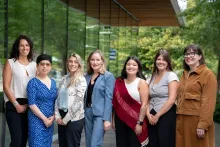
What do you think of when you hear “virtual reality”? Virtual reality immerses participants in realistic simulated environments that stimulate the senses, including vision, hearing, and even touch. Would you think that virtual reality could treat medical conditions?
That’s what one interdisciplinary research team at UBC is exploring.
Dr. Lori Brotto, Professor in the Department of Obstetrics and Gynaecology in the Faculty of Medicine, and her team received funding from UBC Health through the inaugural Health Innovation Funding Investment (HIFI) Awards for their project, Application of Virtual Reality and Concurrent Psychoeducation to Address Vaginismus: Fear of Sexual Activity. The project is assessing the acceptability and feasibility of virtual reality exposure in treating vaginismus.
Vaginismus is a sexual concern characterized by involuntary tightening of the pelvic floor muscles leading to persistent difficulties with vaginal penetration. Affected individuals experience intense fear of sexual activity and gynecological exams. Vaginismus is linked to negative health outcomes, such as impairments in overall sexual function, lower sexual desire, sexual dissatisfaction, reluctance to engage in sexual activity, problems becoming pregnant, and avoidance of cervical cancer screening.
Because vaginismus is similar to a phobia (extreme fear), it is an excellent candidate for exposure therapy. The recommended first line treatment for phobias is cognitive-behavioural therapy with an exposure element. But there are very few effective treatment options for individuals with vaginismus in Canada.
“Vaginismus does not respond to conventional, self-led psychological treatments, likely because individuals cope via longstanding avoidance of penetration, and treatments consist of vaginal dilator therapy,” explains Dr. Brotto. “Because avoidance is so strong in individuals with vaginismus, there is a need for progressive exposure to sexually feared stimuli in a controlled environment, which is what our study is seeking to do.”
To address that gap, there needs to be alternative exposure-based treatments. Dr. Brotto and her interdisciplinary project team realized that virtual reality offered a novel solution to this complex problem. Virtual reality exposure immerses individuals in 3D simulations of feared situations. For vaginismus, patients would be gradually exposed to feared sexual scenes in a virtual environment.
If we find virtual reality exposure to be effective in our study, it would be an innovative treatment for vaginismus that could dramatically improve care for people affected by this sexual difficulty.
The team consulted with a community advisory board of individuals with lived experience of vaginismus on the study design and recruitment strategy to ensure the study was relevant and impactful for individuals with vaginismus. The team will work with this advisory board throughout the project, seeking its input on interpretation of findings and knowledge translation tools.
The study is currently recruiting. Participants view the virtual reality videos at Vancouver General Hospital and complete questionnaires about their feelings before and after watching the videos. Psychosocial support is provided to participants if needed. The project team will also conduct follow-up interviews with them.
Study findings will be used to create the first treatment protocol for virtual reality exposure for vaginismus. The team will also work with the community advisory board to disseminate study findings to obstetricians/gynecologists and primary care providers in BC who are most likely to receive referrals for vaginismus.
“If we find virtual reality exposure to be effective in our study, it would be an innovative treatment for vaginismus that could dramatically improve care for people affected by this sexual difficulty,” says Dr. Brotto.
The interdisciplinary project team members are:
- Dr. Melanie Altas, Clinical Associate Professor, Department of Obstetrics and Gynaecology, Faculty of Medicine
- Dr. Alan Kingstone, Professor, Department of Psychology, Faculty of Arts
- Natalie Brown, Clinical Psychology Graduate Student, Department of Psychology, Faculty of Arts
The project is expected to be completed by December 2022.
For more information about the HIFI Awards, visit the HIFI page.
Posted March 8, 2022



